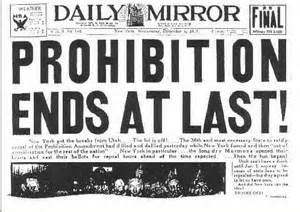The 21st Amendment
Prohibition, created by the 18th Amendment in 1919 and enforced by the Volstead Act of the same year, had progressed for a decade with mixed results. For a variety of reasons, including a stark decline in government revenues from a tax on alcohol and a marked rise in illegal activity of the very sort the legislation was created to prevent, Congress decided to get rid of the 18th Amendment altogether. 
Public opinion by the end of the 1920s was very much against Prohibition. This extended to members of Congress, clearly alarmed at the black market, bootlegging, "speakeasy" operation, and other forms of crime, organized and otherwise, that had arisen against the backdrop of Prohibition. On February 20, 1933, Congress approved the three-section 21st Amendment: Section 1. The eighteenth article of amendment to the Constitution of the United States is hereby repealed. Section 2. The transportation or importation into any State, Territory, or possession of the United States for delivery or use therein of intoxicating liquors, in violation of the laws thereof, is hereby prohibited. Section 3. This article shall be inoperative unless it shall have been ratified as an amendment to the Constitution by conventions in the several States, as provided in the Constitution, within seven years from the date of the submission hereof to the States by the Congress.
Like the Amendment it repealed, the 21st Amendment has a timeline. Section 3 dictates that if all the business of ratification had not been completed after seven years, Congress would have to start again. The last section also directed the creation of special ratifying conventions (the only Amendment so designed), with one purpose. The states obliged and quickly ratified the Amendment, the first being Michigan and the 36th being Utah. Thus, on December 5, 1933, the 21st Amendment came into being and the 18th Amendment winked out of existence. Section 2 of the 21st Amendment, however, hands over enforcement of alcohol laws to the states, banning importation of the substance if a state's law prevents it. Thus, a federal pronouncement that proved unenforceable on a national level became a state pronouncement, shifting the enforcement burden to the state level as well. The result was a new revenue creation: the liquor license. |
|
Social Studies for Kids
copyright 2002–2024
David White




